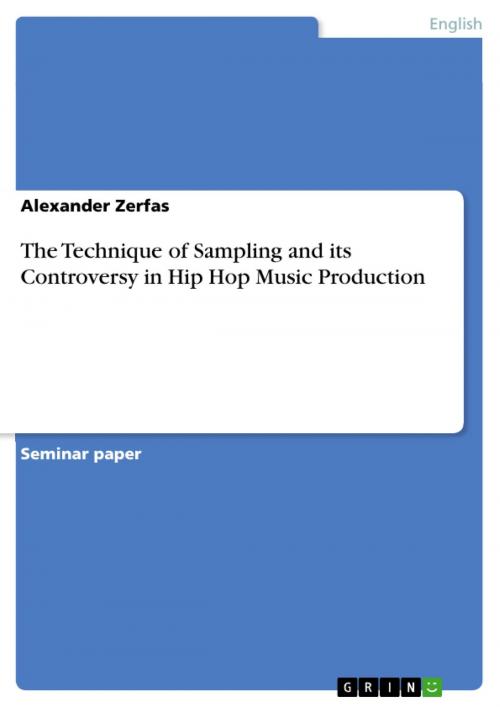The Technique of Sampling and its Controversy in Hip Hop Music Production
Nonfiction, Reference & Language, Study Aids, ESL, Foreign Languages| Author: | Alexander Zerfas | ISBN: | 9783668500433 |
| Publisher: | GRIN Verlag | Publication: | August 8, 2017 |
| Imprint: | GRIN Verlag | Language: | English |
| Author: | Alexander Zerfas |
| ISBN: | 9783668500433 |
| Publisher: | GRIN Verlag |
| Publication: | August 8, 2017 |
| Imprint: | GRIN Verlag |
| Language: | English |
Seminar paper from the year 2014 in the subject English Language and Literature Studies - Culture and Applied Geography, grade: 1,3, University of Erfurt, course: Hip Hop Studies, language: English, abstract: The aim of this paper is to take a look at the technique of sampling regarding the purpose, a definition and the origin of this method. Furthermore, emphasis will be put on the controversy of sampling, followed by a short explanation of the fundamental principles of the copyright law. Finally, a conclusion will summarize the core results and add some closing remarks to this topic. It only took two turntables and a microphone to turn a ghetto dominated by violence, into a united neighborhood and community filled with enough positive energy to create a music genre and culture that took over the whole world rapidly. Ever since the Hip Hop culture emerged in the 1970s in the dirty corners and hopeless streets of the South Bronx in New York, the vinyl record has played a huge role in the development and growth of this movement towards main stream culture. A simple vinyl record has been able to give poor people a way to transform their anger and desperation into art. Even in the age of digital technology, the so called black gold is still relevant, building the foundation for artistic disciplines like scratching and sampling. Since the early days, the technique of sampling has been the core element in making Hip Hop, be it adopting Bruce Lee moves and gymnastic elements to create a new dancing style, taking synthesizer- or vocal sounds for scratching, or the adoption and reconstruction of melodies and drum loops from dusty vinyl records to come up with a whole new way of music production. But can we really see this method as a creative and unique way of self-expression or is it rather a lack of creativity and even artistic laziness?
Seminar paper from the year 2014 in the subject English Language and Literature Studies - Culture and Applied Geography, grade: 1,3, University of Erfurt, course: Hip Hop Studies, language: English, abstract: The aim of this paper is to take a look at the technique of sampling regarding the purpose, a definition and the origin of this method. Furthermore, emphasis will be put on the controversy of sampling, followed by a short explanation of the fundamental principles of the copyright law. Finally, a conclusion will summarize the core results and add some closing remarks to this topic. It only took two turntables and a microphone to turn a ghetto dominated by violence, into a united neighborhood and community filled with enough positive energy to create a music genre and culture that took over the whole world rapidly. Ever since the Hip Hop culture emerged in the 1970s in the dirty corners and hopeless streets of the South Bronx in New York, the vinyl record has played a huge role in the development and growth of this movement towards main stream culture. A simple vinyl record has been able to give poor people a way to transform their anger and desperation into art. Even in the age of digital technology, the so called black gold is still relevant, building the foundation for artistic disciplines like scratching and sampling. Since the early days, the technique of sampling has been the core element in making Hip Hop, be it adopting Bruce Lee moves and gymnastic elements to create a new dancing style, taking synthesizer- or vocal sounds for scratching, or the adoption and reconstruction of melodies and drum loops from dusty vinyl records to come up with a whole new way of music production. But can we really see this method as a creative and unique way of self-expression or is it rather a lack of creativity and even artistic laziness?















